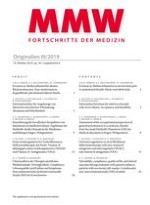Erschienen in:

05.10.2019 | Vorhofflimmern
Orale Antikoagulation bei Vorhofflimmern
Differentialtherapie mit Nicht-Vitamin-K-abhängigen oralen Antikoagulanzien (NOAK) und Vitamin-K-Antagonisten (VKA)
verfasst von:
PD Dr. med. habil. Christoph Sucker, Prof. Dr. med. Jens Litmathe, Prof. Dr. med. Heiner K. Berthold
Erschienen in:
MMW - Fortschritte der Medizin
|
Sonderheft 6/2019
Einloggen, um Zugang zu erhalten
Zusammenfassung
Hintergrund
Nicht-Vitamin-K-abhängige orale Antikoagulanzien (NOAK) haben das Management von Patienten mit oraler Antikoagulation nachhaltig verändert. Es stellt sich die Frage, welche Patienten bevorzugt mit NOAK und welche bevorzugt mit Vitamin-K-Antagonisten (VKA) antikoaguliert werden sollten. Diese Diskussion wurde bisher unzureichend geführt und oft zu pauschal zugunsten der NOAK entschieden.
Methode
Zur Klärung der Frage, welche Form von Antikoagulation — NOAK oder VKA — bei Patienten mit Vorhofflimmern die beste Wahl darstellt, traf sich ein interdisziplinäres Expertenteam.
Ergebnisse und Schlussfolgerungen
Die Experten diskutierten über wesentliche praktische Aspekte der Therapie mit NOAK und VKA. Anhand typischer klinischer Szenarien erarbeiteten sie Hilfestellungen, Anmerkungen und Tipps zum differenzierten Einsatz oraler Antikoagulanzien bei Patienten mit Vorhofflimmern. Als Kriterien dienten u. a. die Praktikabilität in der täglichen medizinischen Praxis, Kontraindikationen, Nebenwirkungen und Interaktionen, aber auch der Patientenwunsch. Die Vor- und Nachteile einer Therapie mit VKA bzw. NOAK wurden in einer Tabelle zusammengefasst.












